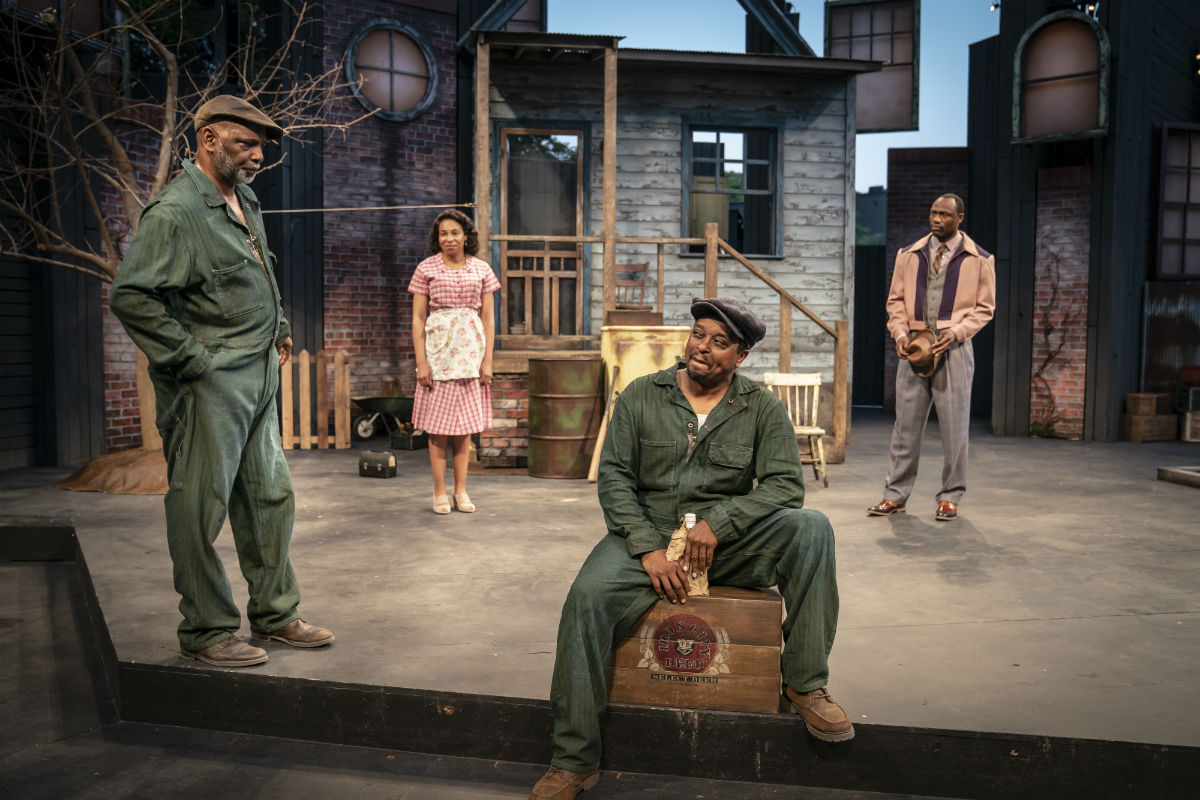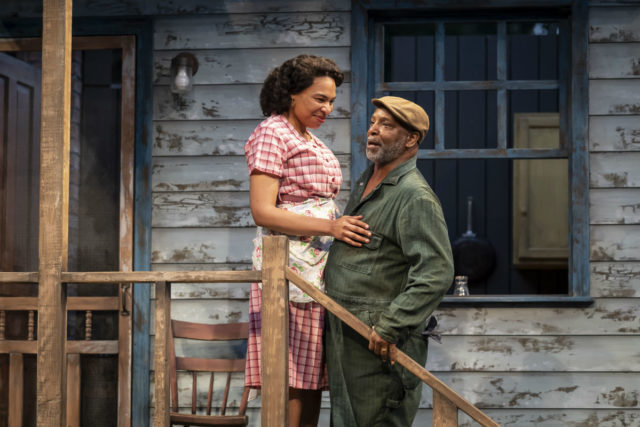Change is as inevitable as it is frightening.
That’s the central theme of August Wilson’s Fences, running through September 28 at American Players Theater in Spring Green, directed by Ron OJ Parson.
The play is one of the 10 plays in Wilson’s seminal Pittsburgh Cycle, which chronicles the African American experience through each decade of the Twentieth Century. It takes place in the 1950s, an era of profound change in the United States as postwar prosperity created a new urbanism for some, but left others behind thanks to lingering racism and Jim Crow laws.
The story centers on Troy Maxson, a 53-year-old garbage collector struggling with disappointment in his two sons, the burden of caring for a brother disabled by a war injury, dreams of a baseball career that could have been and a wife who just wants to hold her little family together.
The entire play takes place in the Maxsons’ backyard, where Troy and his teenage son Cory have spent months building a fence, one small section at a time. The fence is a not-very-subtle metaphor, of course; while Troy’s wife Rose wants the fence to keep people in — to keep her family together and healthy and happy — Troy is more concerned about keeping the encroaching modern urban world out. That feeling of encroaching modernism is clear in the text and also manifests in Shaun Motley’s gorgeous set, as towering brick buildings with amber-glowing windows loom menacingly over the Maxsons’ small clapboard house and its peeling paint.

Troy is a gadfly, a larger-than-life storyteller, a man who takes up all the oxygen in the room. He’s charismatic, the kind of guy everybody likes but who’s very difficult to love. He was a power hitter in Negro League baseball but never got a chance in the segregated big leagues. Even though he clearly exaggerates some of his baseball exploits, he is believable as a former elite athlete, thanks in large part to the performance of David Alan Anderson, who carries Troy with a raw physicality that’s hard to ignore.
As Troy, Anderson knocks it out of the park farther than Troy would hit a hanging curveball. He is an absolutely magnetic presence on stage, and creates a deep and troubling contradiction in the audience — you can’t help but like him, even as he says and does kind of terrible things. You can feel the tension in his muscles as Troy struggles to control things he has no business controlling, including his own past and the futures of his children.
It would be easy to portray Rose, Troy’s wife, as long-suffering and beaten down, but Karen Aldridge imbues her performance with strength and agency, which complements Anderson’s performance perfectly. It is easy to see how Troy respects and loves her even as she expects more of him than he is willing to give.
The rest of the supporting performances are a bit uneven. Yao Dogby’s performance as Cory is strong but somewhat one-note, and as longtime best friend Jim Bono, Bryant Louis Bentley is a wonderfully authentic storytelling partner for Troy in the first act, but swings a little too far into melancholy in the second. Another shining performance is Gavin Lawrence’s — as Troy’s brother Gabriel, cognitively disabled by a traumatic brain injury suffered in the Army, Lawrence is both heartbreaking and uplifting.
It is a surprisingly wonderful experience to see this particular play outdoors. It offers the true sense of kicking back in the backyard, with crickets that aren’t a sound effect and even a gentle breeze. The staging is a touch ostentatious at certain moments, as the actors occasionally seem to step out of the backyard and onto the stage in a way that lets the authenticity slip, however briefly. For the most part, though, the use of the stage space supports the characters and the story, as Anderson is never in the same place for more than a few moments and seems to have full reign to fill the entire space with his impressive presence. The two best-known monologues which question and undermine Troy’s righteousness — one delivered by Rose and the other by Cory — take place with the actors anchored in dead center stage in a manner that is believable while also signalling that this is an important speech that you’d best stop and listen to.
Fences in one of Wilson’s most-performed and most-read plays, but continues to feel relevant. It’s perhaps more relevant than ever, especially as relates to change. Troy is motivated in large part by the feeling that things are changing around him in ways that affect him but over which he has no control. One could argue that this is the same feeling many in the majority feel today — as the culture struggles to give more agency and equity to racial, ethnic, gender and sexual minorities, white, cisgender, heterosexual people can feel a sense of discomfort that things are changing too fast, and that they may be forced to make sacrifices in the name of equality. This discomfort can lead to a sense of racial resentment and can spark a backlash and even violence. It’s the same kind of discomfort that boils just under Troy’s skin. This script does not excuse the behavior that discomfort sparks in Troy, nor does it blame him entirely for feeling it. This performance does, however, force us to ask what we’re going to do with that discomfort.
Fences will be performed four more times this month: September 7, 14, 22 and 28. Tickets are available at AmericanPlayers.org and are $65 and $76, or $32.50 and $38 for student rush seats.


































